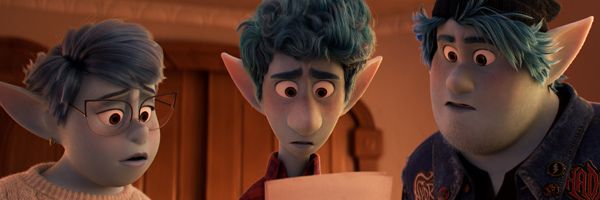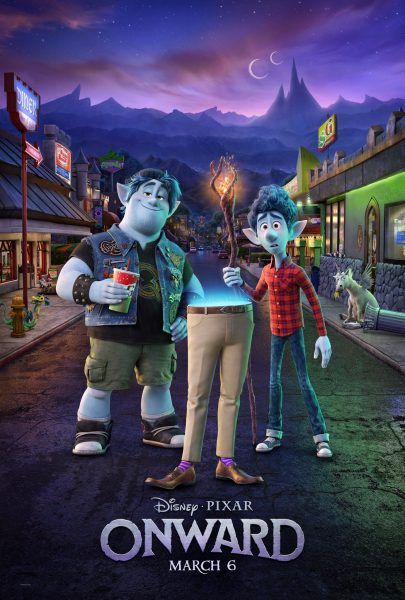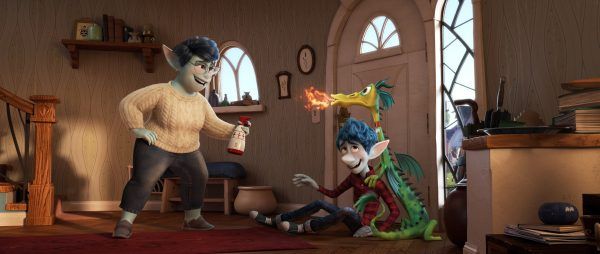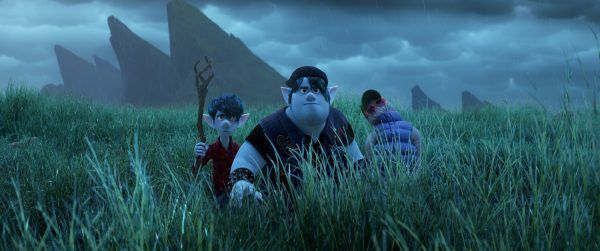Pixar's new movie Onward is now in theaters. Directed by Dan Scanlon, the film takes place in a fantasy world that's filled with modern conveniences and follows brothers Ian (Tom Holland) and Barley (Chris Pratt) as they go on a journey to find a magic gem that will allow them to bring back their deceased father for just one more day.
Kelsey Mann, the head of story on the project who has also worked on Monsters University and The Good Dinosaur, came to Atlanta for the film's press tour and during our conversation we talked about how Ian's arc changed during the course of making the movie, how they developed the B plot so that the boys' mom wouldn't be an antagonist, how they constructed the rules of "magic" for this world, the depiction of this fantasy setting, and more.
Check out the full interview below. Onward is now in theaters.
What were some of the major things that changed from the genesis of the project and to the final product?
KELSEY MANN: These movies are really different from the first screening, to the last. We always do a screening every three months and we typically do about eight screenings with a ninth screening that's the audience preview. If you watch the first screening of every one of our Pixar films, they're really different from the end. I was actually shocked at how different they are. This film, it's funny, we had kind of both where we had... I always had this ending that we knew was right. Have you seen the film?
I have.
MANN: Yeah. Okay. We always had the ending, right? We always had that ending and we story boarded that from the screening one and it always stayed the same, but everything before it changed dramatically. Ian, in the initial versions, he was really into magic and he wanted to meet dad so that he could be a better wizard. We realized that wasn't emotional. He was using dad to get what he wanted and we're like, what if we just flopped it? What if he had to learn magic in order to meet dad and so his ultimate goal was meeting his father. The other version he kind of wanted to be a wizard more than he wanted to meet dad and there was something kind of distancing about it and just not very emotional. There were versions where Ian was the one who was really into magic, a lot like Barley. A lot like Barley, but there was something distancing about that because the audience didn't know what magic was and how it worked and then the main character did. The main character was ahead of the audience, which is kind of distancing versus when we switched it, Ian was asking the same questions that the audience was. Like, wait, what? What is hearts fire? Slow down for a second. What are you talking about? Then the movie start to work better.
Is it hard to break a story like this when magic is a factor because magic has to have its own set of rules or else it just becomes kind of a shortcut. Can you talk a little bit about getting those rules defined throughout the process?
MANN: Yeah, that took a while. Magic, the rules of how magic work, took a while to kind of figure out. I remember Kristen Lester and I, she was one of the first story artists on the film, I remember us very early on trying to figure out the rules of magic and I us pitching a bunch of stuff to Dan. Dan kind of was like, his eyes glazed over and he was like, look guys, I almost want to figure out what we need magic to be and then build the rules around it. We'll put the rules later, don't start with the rules, let's figure out what we need story-wise and then put rules around it. One of the things early on that I remember us figuring out is magic... There's so many versions of magic in film and properties, right? I remember us early on looking at how magic works and there's different components to magic. There's the material component, which is like, Oh, you need a gem in order to do this spell. There's sematic where the movement that you do. There's a verbal component like what you say, how you say it and then I remember us coming upon an idea of what if there was an emotional component? In order to do this spell you have to trust yourself. When we figured that out, then suddenly the scenes worked a lot better.
There was that scene where they're crossing that bridge, the bottomless chasm. We did versions of that where you could see the bridge and all Ian was doing was straining really hard. There wasn't a game to it. There wasn't an internal game that he had to play. Once we made the bridge visible and made it so that the only way it's there is if you believe it's there and suddenly it became an internal game that Ian could play and we could see him overcome something internal versus just how hard could he strain to do.
It's a fun throwback to Wiley Coyote with how they're okay as long they don't look down.
MANN: Yeah, totally man. Yeah. That really helped unlock a more emotional internal growth in magic, which is really great for us story-wise.
What's good about the story is you have that brother storyline that's driving the plot, but you also have the strong subplot between the mom and the Manticore. Can you talk a bit about how that was brought in and how that developed?
MANN: I'm glad you asked about that. I haven't been asked about that too much, so I'm excited to talk about it. In each screening, we do have like eight screenings, you can't tackle everything in every single screening, sometimes you have a focus, right? The B story was something we did later on. I want to say it became a focus, right around screening six is when we started to really... We always worked on it, but we focused our energy on making sure that the Ian/Barley storyline was working. We had multiple versions of the B story. Sometimes it would be Colt and mom and for the longest time we had mom trying to stop the boys because she was worried about them. I remember around screening six that we were looking at the mom storyline and we realized that we were never going to get behind mom stopping the boys because the audience wants the boys to see their dad.
Right. She can't be the antagonist.
MANN: Yeah. Well, what if we switched it? What if mom was trying to help the boys? What if she knew something that the boys didn't? If they weren't there then they'd be screwed, right? Then you'd at least be like, mom, get there. We always really loved the Manticore, especially when we cast Octavia Spencer and Julia Louis Dreyfus. We kind of wanted to get them in the car together. It really came from that excitement of putting those two characters together and so we were like, well, let's have the Manticore go along. Let's have these two incredible actresses together as the B plot, going along and helping the boys achieve their goal, but they don't know they need their help, but the audience does. Suddenly the B plot worked really well because you're rooting for them. For the longest time you're kind of just... It didn't really work because you didn't want them to succeed. You didn't want mom to succeed because you didn't want the boys to be stopped.
One of the things I really loved about this film was the setting, the combination of high fantasy meets industrial revolution. Can you talk about developing that feel because it plays into both storylines in terms of what the characters do rather than taking the highway or the path of peril or mom going to a pawn shop.
MANN: Yeah. That's something Dan came up with early on. I remember him thinking about his own life and what he wanted to say and what kind of movie he wanted to do and he thought about his own life and he thought about never having a chance... He never knew his father. He thought, God, what if there's a character like me that had a chance to meet the father he never knew? He thought, oh, how could I make that happen? How could I spend one day with my dad? Oh, it would be like a spell. That would probably do it. That's literally where the magic came from, was to give the main character that opportunity. That's kind of where it came from and then Dan, he's a really funny guy. He's not a huge fantasy guy. He kind of took fantasy for that purpose, but then I think he just thought it would be really fun to combine the modern world with a fantasy world.
I remember him doing a drawing of a unicorn eating out of the dumpster and there was something about that image that was funny. I'm like, oh, I've never seen that, you know? It's kind of in Dan's style too... We don't want to make fun of fantasy, but we want to poke fun at it a little bit, you know, but we want to pay homage to the genre, but have a little fun with it and make it something unique because there's a lot of fantasy out there. We were like, this is a different, I've never seen a unicorn like that before. What was fun was telling kind of a high fantasy story through a modern lens. It was always super fun to think of, okay, what are some classic fantasy things and how can we modernize that?
There's a lot of really fun ideas that we tried that ended up not working, but it was always fun to come up with ideas of like, oh, the labyrinth is now a mall. They turned it into a mall. They just added stores. It was always super fun to do that combination.
Another thing I think the film does really well is that it's able to quickly establish why the world is the way that it is. Can you talk a bit about how you're able to avoid getting too hung up on exposition or a prologue that's taking you away from your characters?
MANN: Yeah. To boil it down to what it's in the film, took a long time. You're right. You're not starting with the main character for a very long time, but you have to set the audience up with what the hell is going on. We just kept cutting it down to it's bare minimum that we needed it to be. That's really where we come in and just storyboard all kinds of versions and we eventually dwindle it down to what it needs to be. Every once in a while we'll do something later in the film that we'll have to put at the beginning. Like oh, it'd be really great to see a dragon at the beginning and see... I remember the story team really pushing, we want to see like a fellowship going on a quest because that's what the boys are going to do, so it'd be kind of cool to see a little glimpse of a fellowship quest in the beginning. Yeah, you're right. To get it down to that essence just took time and we really do that in the editorial way.
Did you ever do friends and family screenings too? Sometimes you get so into it, you can be like, well it makes sense to me because I've been living with this for years, but an outsider may be like, I'm still confused on how this world functions.
MANN: We didn't do too much outside the studio type screenings. This particular film, sometimes we'll do that at Pixar if the concept is really high and we're afraid that children aren't going to get it, sometimes we'll pull in people for that and it'll be just the friends and family. Typically family, people who've got kids will come in to the studio. We never worried about that on this particular film because the whole combination of fantasy and modern, we felt like it was pretty gettable. We didn't need to explain it. It wasn't too out there. A film like Inside Out needed that a little bit more than us, so we never really did that too much. The only time that we did it was for the audience preview where we took it out and showed it to a general audience of different ages. To get that outside perspective, there's always people at the studio who haven't worked on the film at all and so we're always trying to bring them in and get their fresh perspective on it.
In fact, that's one of the things when they fill out... We have an internal website where you can submit your notes and one of the questions is have you seen any other screenings before or is this your first time? You want that fresh perspective throughout the entire thing. Yeah, we never felt like we needed to bring anybody outside.
How did this experience compare to working on The Good Dinosaur and Monsters University?
MANN: It was really cool for me. I've done two films now with Dan and what was really cool is to watch Dan grow. It's pretty cool. I was there at the beginning when he was like, all right, I'm a director now. To see his confidence grow, it's pretty awesome. I got to see him just be more confident in the room with his decisions. He's doing a lot at the studio, not just for the film, but he's helping a lot at the studio now that we've got Pete Docter is our chief creative officer. Pete likes to share the weight of leading the studio creatively with other people. He doesn't want to be the one at the top. He wants to share that heavy burden. Dan's been carrying a lot of that too. I've been seeing him not only grow as a director, but just as a leader at the studio, which has been really inspiring.




